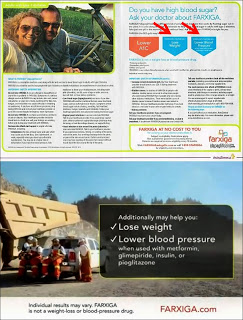 |
| Print and TV DTC ad for Farxiga (click on image for an enlarged view) |
Public Citizen, a consumer advocacy group with more than 350,000 members and supporters nationwide, sent FDA’s OPDP Director Tom Abrams a letter on March 31, 2015, urging him “to stop the apparently violative off-label promotional statements in the direct-to-consumer (DTC) advertisements of five prescription drugs approved for the treatment of Type 2 diabetes. The drugs are Farxiga (dapagliflozin), Jardiance (empagliflozin), Invokana (canagliflozin), Victoza (liraglutide) and Bydureon (extended-release eventide).”
Usually, pharmaceutical companies are accused of promoting drugs “off-label” to physicians, which is understandable because it is perfectly legal for physicians to prescribe drugs for so-called off-label use.
The FDA rarely cites off-label or “unapproved use” claims made in DTC ads. None of the letters issued by FDA in 2014 mentioned that violation. Historically (between 2004 and 2013), only 4% of violations cited in FDA letters were concerned with off-label/unapproved use promotion and no TV ad received such a letter (see here).
Public Citizen includes a Farxiga ad that “touts” weight loss and blood pressure reduction as potential benefits although the drug has not been approved for those indications (see the ad in the above figure; also included is a screen from the TV ad).
“These five drugs have been approved solely to lower hemoglobin A1C levels in patients with Type 2 diabetes,” says Public Citizen, “but the advertisements presented in this letter clearly convey the false perception to patients and doctors that the drugs have been deemed safe and effective for weight loss and/or reducing blood pressure.”
Public Citizen wonders if the FDA approved the ads and asks a couple of interesting questions in light of the recent paucity of warning letters issued by the FDA (read “Banging Year for Drug Approvals, Wimpy Year for Enforcement Actions”).
- Has the Food and Drug Administration (FDA) reviewed and approved the advertisements presented in Appendix 1 prior to, or since, their release? If not, what is the agency’s position on the weight-loss claims, as well as the blood-pressure-reduction claims for Farxiga and Invokana, made in the advertisements? If the agency did review and approve the advertisements, what was its rationale for allowing the inclusion of the weight-loss and blood-pressure-reduction claims?
- Has the FDA approved similar off-label efficacy claims in other DTC advertisements? If so, did these approvals result from a formal policy allowing such off-label efficacy claims in pharmaceutical DTC advertisements?
Meanwhile, reports Pharmalot, the pharmaceutical industry would like the FDA to go still further and allow drug makers to distribute new information about the effectiveness of their medicines. “To date, FDA has not taken a similarly flexible approach to dissemination of information about efficacy of approved products,” said PhRMA in comments to the FDA.








![6 Digital Tools at the Center of Healthcare Digitalization [INFOGRAPHIC]](http://ec2-54-175-84-28.compute-1.amazonaws.com/pharma-mkting.com/wp-content/uploads/2021/04/6DigitalTools_600px-100x70.jpg)




